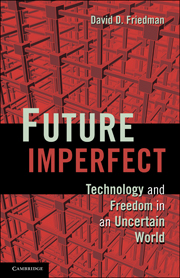Book contents
- Frontmatter
- Contents
- PART ONE PROLOGUE
- PART TWO PRIVACY AND TECHNOLOGY
- PART THREE DOING BUSINESS ONLINE
- 6 Ecash
- 7 Contracts in Cyberspace
- 8 Watermarks and Barbed Wire
- 9 Reactionary Progress – Amateur Scholars and Open Source
- 10 Intermission: What's a Meta Phor?
- PART FOUR CRIME AND CONTROL
- PART FIVE BIOTECHNOLOGIES
- PART SIX THE REAL SCIENCE FICTION
- Notes
- Bibliography
- Index
7 - Contracts in Cyberspace
Published online by Cambridge University Press: 18 August 2009
- Frontmatter
- Contents
- PART ONE PROLOGUE
- PART TWO PRIVACY AND TECHNOLOGY
- PART THREE DOING BUSINESS ONLINE
- 6 Ecash
- 7 Contracts in Cyberspace
- 8 Watermarks and Barbed Wire
- 9 Reactionary Progress – Amateur Scholars and Open Source
- 10 Intermission: What's a Meta Phor?
- PART FOUR CRIME AND CONTROL
- PART FIVE BIOTECHNOLOGIES
- PART SIX THE REAL SCIENCE FICTION
- Notes
- Bibliography
- Index
Summary
You hire someone to fix your roof and (imprudently) pay him in advance. Two weeks later, you call to ask when he is going to get the job done. After three months of alternating promises and silence, you sue him, probably in small claims court.
Suing someone is a nuisance, which is why you waited three months. In cyberspace it will be even more of a nuisance. The law that applies to a dispute depends, in a complicated way, on where the parties live and where the events they are litigating over happened. A contract made online has no geographical location and the other party might live anywhere in the world. Suing someone in another state is bad enough; suing someone in another country is best left to professionals – who do not come cheap. If, as I suggested in an earlier chapter, the use of online encryption leads to a world of strong privacy, where many people do business without revealing their realspace identity, legal enforcement of contracts becomes not merely difficult but impossible. There is no way to sue someone if you do not know who he is.
Even in our realspace lives, however, there is another way of enforcing contracts, and one that is probably more important than litigation. The reason department stores make good on their “money back, no questions asked” promises, and the reason the people who mow my lawn keep doing it once a week even when I am out of town and so unable to pay them, is not the court system.
- Type
- Chapter
- Information
- Future ImperfectTechnology and Freedom in an Uncertain World, pp. 97 - 107Publisher: Cambridge University PressPrint publication year: 2008



